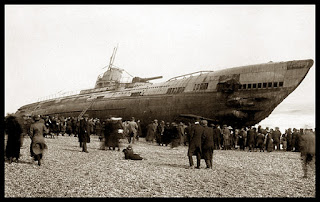The story of A Century of November takes place in a time where Germany prepared to attack any and all ships, including civilian passenger carriers, said to be sighted in war-zone waters.
This was one of the components that pushed the United States of America to call for a declaration of war against Germany.
On this day 100 years ago…
Germany resumes unrestricted submarine warfare…
This began in part with pressure from neutral countries and out of fear the U.S. would enter the war on the side of the Allies.
When World War I erupted in 1914, President Woodrow Wilson pledged neutrality for the United States, a position that the vast majority of Americans favored. Britain, however, was one of America’s closest trading partners and tension soon arose between the United States and Germany over the latter’s attempted blockade of the British isles. Several U.S. ships traveling to Britain were damaged or sunk by German mines and, in February 1915, Germany announced unrestricted warfare against all ships, neutral or otherwise, that entered the war zone around Britain. One month later, Germany announced that a German cruiser had sunk the William P. Frye, a private American merchant vessel that was transporting grain to England when it disappeared. President Wilson was outraged, but the German government apologized, calling the attack an unfortunate mistake.
The Germans’ most formidable naval weapon was the U-boat, a submarine far more sophisticated than those built by other nations at the time. The typical U-boat was 214 feet long, carried 35 men and 12 torpedoes, and could travel underwater for two hours at a time. In the first few years of World War I, the U-boats took a terrible toll on Allied shipping.
In early May 1915, several New York newspapers published a warning by the German embassy in Washington that Americans traveling on British or Allied ships in war zones did so at their own risk. The announcement was placed on the same page as an advertisement for the imminent sailing of the British-owned Lusitania ocean liner from New York to Liverpool. On May 7, the Lusitania was torpedoed without warning just off the coast of Ireland. Of the 1,959 passengers, 1,198 were killed, including 128 Americans.
The German government maintained that the Lusitania was carrying munitions, but the U.S. demanded reparations and an end to German attacks on unarmed passenger and merchant ships. In August 1915, Germany pledged to see to the safety of passengers before sinking unarmed vessels, but in November sank an Italian liner without warning, killing 272 people, including 27 Americans. Public opinion in the United States began to turn irrevocably against Germany.
At the end of January 1917, Germany, determined to win its war of attrition against the Allies, announced the resumption of unrestricted warfare. Three days later, the United States broke off diplomatic relations with Germany; just hours after that, the American liner Housatonic was sunk by a German U-boat. None of the 25 Americans on board were killed and they were picked up later by a British steamer.
On February 22, Congress passed a $250 million arms-appropriations bill intended to ready the United States for war. Two days later, British authorities gave the U.S. ambassador to Britain a copy of what has become known as the “Zimmermann Note,” a coded message from German Foreign Secretary Arthur Zimmermann to Count Johann von Bernstorff, the German ambassador to Mexico. In the telegram, intercepted and deciphered by British intelligence, Zimmermann stated that, in the event of war with the United States, Mexico should be asked to enter the conflict as a German ally. In return, Germany would promise to restore to Mexico the lost territories of Texas, New Mexico and Arizona. On March 1, the U.S. State Department published the note and America was galvanized against Germany once and for all.
In late March, Germany sank four more U.S. merchant ships and, on April 2, President Wilson appeared before Congress and called for a declaration of war against Germany. On April 4, the Senate voted 82 to six to declare war against Germany. Two days later, the House of Representatives endorsed the declaration by a vote of 373 to 50 and America formally entered World War I.
By 2013 41 sunken German World War One U-boats were discovered off the coast of England. They were found at a depth of about 50 feet (15.24 meters).
History is part of our lives… We need to remember, always… Who we are and where we have come from…
Because on a global scale so many human beings have sacrificed their lives fighting conflict after conflict…
so that we may live…
100 years later… after the end of THE GREAT WAR… The war that was suppose to end all wars...
PEACE FOR ALL MANKIND!







